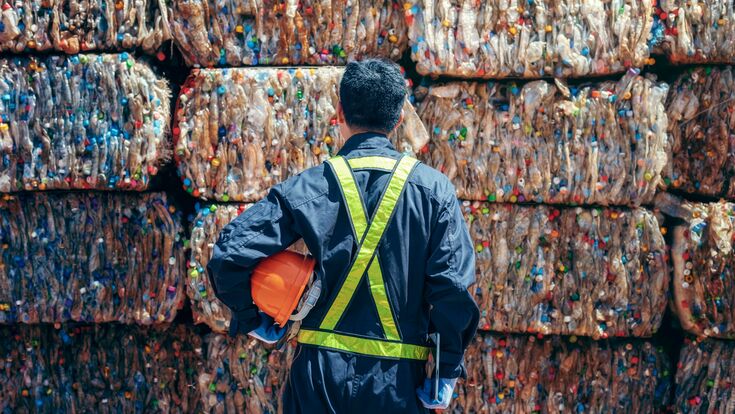Waste Exports : Banning Waste Shipments: The Industry responds

The European Parliament (EP) has given its backing to the new Waste Shipment Regulation that lays down procedures and control measures for the shipment of waste, depending on its origin, destination and transport route, the type of waste shipped and the type of waste treatment applied when it reaches its destination. MEPs adopted the report with 594 votes in favour, 5 against and 43 abstentions.
The key points of the regulation are:
- Banning shipments of all wastes destined for disposal within the EU, except if authorised in limited and well-justified cases
- Waste shipped outside the EU must be managed in an environmentally sound manner
- Banning the export of hazardous waste to non-OECD countries
- Exporting non-hazardous waste for recovery would be allowed only to those non-OECD countries that give their consent and demonstrate their ability to treat this waste sustainably
- Banning the export of plastic waste to non-OECD countries and phasing out its export to OECD countries within four years.
The industry voices concerns
Organisations such as the Rethink Plastic Alliance “applaud the proposal”. Stephane Arditi, Director for Climate, Circular Economy and Industry at the European Environmental Bureau, a member of the alliance, said: “The groundwork is now laid for EU countries to restrict a kick-the-can-down-the-road approach in the global waste management system, prioritise waste prevention and seize the opportunity for the EU to preserve precious secondary raw materials.” But the recycling industry voiced its concerns regarding the proposed legislation.
The Bureau of International Recycling (BIR) said in a statement that it is very concerned about the new law’s potential impact on the global circular economy. There is a fine line between applying the proximity principle for wastes, keeping them in the EU, and commercially disadvantaging trading partners outside the EU, denying them resources, the BIR said in a response. “It should be blatantly clear to everybody that the trade of vital raw materials such as recycled metals should not be restricted, and BIR as an organisation remains fully committed to ensuring exactly that – free trade of recyclables in a global circular economy!” said BIR President Tom Bird.
EuRIC (the European Recycling Industries’ Confederation) sees positive and negative effects on the recycling industry: “While many adaptations will facilitate recycling within the EU, some measures on exports, including the ban on all green-listed plastic waste entries exported to OECD and non-OECD countries outside the EU and EFTA, will instead hamper European recycling,” EuRIC wrote in a letter. “Export restrictions must not lead to unjustified punishment of market actors committed to legally carrying out their activities and contributing to saving energy and reducing CO2 emissions on a global scale within and outside Europe.”
They further called on EU decision makers to consider five actions from the European plastics recycling industry, including harmonised end-of-waste criteria, proportionate export rules for high-quality recycled plastics and harmonised revocation grounds for pre-consented facilities.
The FEAD (European Waste Management Association) welcomed the steps taken by the EP towards an EU single market for waste as well as the extension of confirmation deadlines for facilities to two working days. However, it sees the regulation as a missed opportunity for needed improvements, such as the reinforcement of pre-consented facilities.
Claudia Mensi, FEAD President, said: “In terms of exports, we must avoid a de facto ban, and work with a more nuanced waste-stream-specific approach and reasonable administrative burdens for third countries. Non-hazardous ‘green-listed’ waste is a commodity and, when there is insufficient demand in the EU, it must continue to be possible to ship it outside the EU, where it will be reincorporated in manufacturing processes.”
At the same time, the UK government announced that it would not move forward with the recommendation of the Environment, Food and Rural Affairs Committee (EFRA) to ban the export of all plastic waste. Last November the cross-party MPs’ parliamentary scrutiny body published its report “The price of plastic: ending the toll of plastic waste”, calling for an end to plastic exports by 2027.
“Our ambition is to reduce the UK’s dependency on waste exports, but we disagree with the Committee’s recommendation of a ban on all plastic waste exports. We expect legitimate exports to continue to have a role in the management of plastic waste generated in the UK,” the government wrote in its response. But it has committed to banning the export of plastic waste to countries which are not members of the Organisation for Economic Cooperation and Development (OECD). Such destinations accounted for 20% of all UK exports in 2020.
The government recognised the 2021 Greenpeace report that highlighted cases of plastic waste originating from the UK being dumped and burned in Turkey. Nevertheless, the UK government defended plastic exports to this country, stating that the Turkish plastic recycling sector is estimated to be twice the size of the UK’s.
EFRA has expressed surprise and disappointment at the government’s response. “Our recommendation to ban plastic waste exports by 2027 was partly aimed to help develop a multimillion-pound plastic waste recycling industry in the UK, supporting hundreds of jobs,” EFRA Chair Sir Robert Goodwill said. “We will be watching carefully to see if the government reaches its stated – but I’m afraid rather vague – ambition to eliminate what it calls ‘avoidable’ plastic waste by 2042 and make producers more responsible for the plastics they use.”

